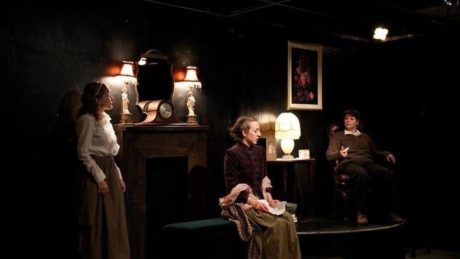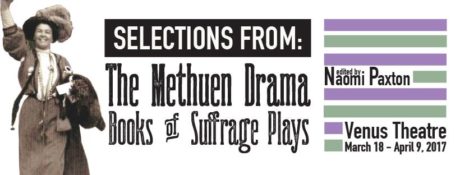This review comes after I saw the final performance of Venus Theatre’s remarkable, inspiring, supremely artistic vision: Selections From: The Methuen Drama Books of Suffrage Plays. But in my view, a review is still worth writing (and hopefully is still worth reading) because even if you missed this show, it may coax you into seeing the next masterpiece at the little Venus Play Shack in Laurel, MD, “The House That Love Built” as it is sometimes known.
The unwieldy title of Venus’ current production belies a fantastic gem of theatre and political history; five short plays, all written in the 1910s for a variety of pro-suffrage groups and papers in England, that are ruthlessly witty and unapologetically polemical.
Between and amongst these Edwardian jewels, however, is an undeniably contemporary sensibility that is pure Venus. From free pussy hats in the lobby to a post-show 80s dance party to the use of a potted plant as a character, director (and Venus Artistic Director) Deborah Randall allows her irrepressible artistic and political sensibilities to play freely throughout these old plays, like a couple of children making mischief in an antique store. As a matter of fact, the beautiful set by Amy Rhodes (who is also the lighting designer) looks like an antique store – lovely Art Nouveau pieces and even a vintage 1910s telephone. The sumptuous costumes are by Deborah Randall, and the pitch perfect sound is by Neil McFadden.
For some helpful context, here is an excerpt from the introduction to the Methuen anthology that was provided in the press release:
The plays featured in this volume are just a small selection of the huge number and variety created by the Actresses’ Franchise League (AFL) from 1908-1914.
The Actresses’ Franchise League, in case you were wondering, was a badass women’s suffrage organization that not only distributed literature and held public rallies, also produced plays, some of which are before us now in this collection.

The first play, An Anti-Suffragist or The Other Side, by H.M. Paull, is ten minutes of brutal sarcasm delivered with caustic charm by Allison Frisch. The second, The Mothers Meeting by Mrs. Harlow Phibbs, is also a monologue piece about Mrs. Peter Puckle, a woman who accidentally gets pushed into speaking at anti-suffragist rally – where she promptly goes on to share a powerful and personal pro-suffrage message.
A long time veteran of DC area stages, Miller lights up the tiny Venus black box with her magnetic presence. Funny yet powerful, she tells a tale of accidentally walking into a public meeting of a well known anti-suffragist, and becoming compelled to speak herself of her own views on women’s right – which, needless to say, clash with the “woman’s place is in the home” crowd.
Her Vote, by H.V. Esmond, is a hilarious parody of women who may have been in the suffrage movement more for fashion’s sake than for political conviction. And Tradition, by George Middleton, is actually not about voting rights but about a young woman (played with endearing honesty by Emily Sucher) who yearns to be an actress but is at odds with her conservative father (played by a pipe smoking Erin Hanratty – the handful of male roles in these plays are also played by women).
The last play is perhaps the most interesting: Lady Geraldine’s Speech, by Beatrice Harriden. The tongue-in-cheek premise is that Lady Geraldine, played by Emily Sucher, goes to her dear suffragist friend Dr. Alice Romney (Erin Hanratty) to write her a speech – for an anti-suffragist conference. Dr. Romney accedes only because they are old school friends. But during the course of her writing, a who’s who of renowned suffragists – a lecturer (Jean H. Miller), a pianist (Christine Jacobs), a painter – come into Dr. Alice’s room to present their wise and witty thoughts about “the movement”. Little do they know that their guest is on “the other side” – Hilarity ensues.
At one remarkable point in the last play, the role of Dr. Alice Romney (Erin Hanratty) is replaced with a potted plant and her lines are read by a “Stage Manager”, played by Myrrh Cauthen. While the plant takes her place, Hanratty runs backstage, changes her costume, and comes back on as Miss Gertrude Silberthwaite, a different character who is also a suffragette. Each of the actors respond to this last minute cover up as though the change is happening in real time, although of course the action is planned. Could Venus not get another actor for the role? Did Randall feel that Hanratty simply had to play both roles? Who cares?! It was one of the weirdest and funniest moves I’ve seen slipped into an old script which clearly did originally include it, and it had the audience in stitches.
It was the most aggressive example of fourth wall breaking in this production, but by no means the only one. This constant interaction with the audience created an atmosphere of play, where we were all in this together, actors and audience. It was an event, not just a spectacle that we passively watched. In short, it was all that is cool about theatre. Even the 80s dance party that followed the show, which was one of three options that the audience literally voted on as to what would follow the performance (singing a song and leaving quietly were the other choices), was an act that created tremendous connection between the actors on stage and the audience seated around them. It was a very effective way of reversing the alienating effect that old plays can often have on audiences.
The challenge with plays like this is not only that they are old, but that even in their day they had a very specific audience and purpose and it isn’t always a sure thing that it will translate to this day and age. But in the case of Methuen, it does. The themes of wage inequality and social pressure to remain in the domestic sphere are just as prevalent now as a hundred years ago. Women may have gotten the vote, but even then the activists knew that that was only a beginning to true equality, and that fight is being waged in part by theaters like Venus.
Running Time: 90 minutes, with no intermission.
Selections From: The Methuen Drama Books of Suffrage Plays played through April 9, 2016 at Venus Theatre Company – 21 C Street, in Laurel, MD. For more information about Venus Theatre Company, including a calendar of their upcoming shows, please visit their website.





